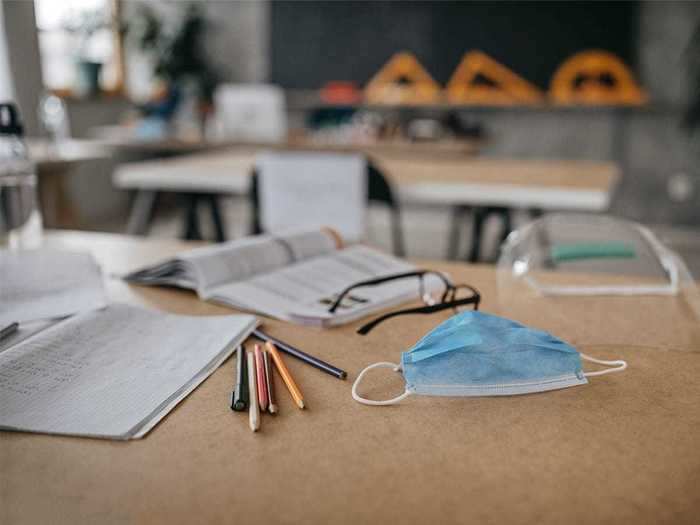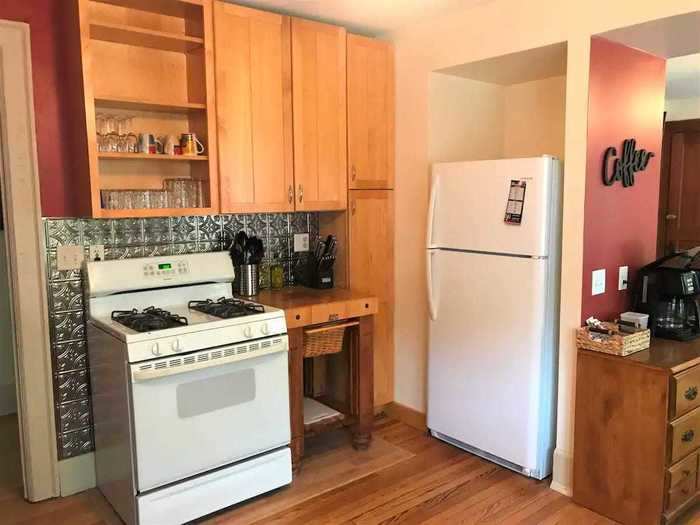When you buy through our links, we may earn money from our affiliate partners. Learn more.
- The novel coronavirus has interrupted education on a wide scale with many schools still deciding if they will hold classes on campus this fall or go virtual.
- Traveling to colleges and moving into dorms will likely pose extra challenges in the COVID-19 era for students and their parents accompanying them for the big move.
- We talked to an infectious disease expert to learn about the risks and get tips on proper precautions that parents and students should take.
- Read more: The best college supplies and dorm room essentials
As the novel coronavirus continues to sweep the nation, it has upended daily norms. People are making big changes when it comes to how they work, shop, eat and drink, and even vacation.
Another major field that's been disrupted is education. Many schools across the country cut the end of the school year short and headed online, as e-learning saw a surge in popularity.
Now, with the back-to-school season around the corner, schools are once again grappling with the decision of in-person classes, online lessons, or a mix of both. That goes for colleges, too.
Some colleges and universities have gone virtual, while others are welcoming students and teachers back to campus. Moving day, usually a beloved tradition filled with teary-eyed parents seeing off starry-eyed students, comes with a lot of questions this year when it comes to safety, as it often involves some degree of travel. Is it safe for parents to pack up the car and help move their student into the dorms? Where should they stay?
The good news is that, according to Dr. Thomas Russo, chief of the division of infectious disease at the University at Buffalo, the answers to these questions are largely encouraging — but with some big caveats.
"I think it's okay for parents to help their children move into dorms," says Dr. Russo. "But obviously the devil is in the details in terms of how the school has it set up in terms of opening day."
And if you'll be traveling from far away, there are additional factors to consider, too. "The travel part is something you should always think about during this age of COVID," cautions Dr. Russo.
After all, there is no guarantee of safety when it comes to travel right now, but there are some precautions you can take to help make traveling to college and facing move-in day safer. Call the school or check their website ahead of time to find out exactly how move-in day will work and what precautions are being taken, before deciding if your family feels comfortable traveling.
If you decide to travel, here's what the doctor says you should know. And if you do find yourself heading to a college town in the US, we rounded up top-rated private vacation rentals for several popular locations, which, Dr. Russo says is a safer place to stay compared to hotels, because you are booking an entire home protected from interaction with others.
Top tips include:
Read on for a full breakdown of safety tips and precautions to take when traveling to college campuses for move-in day, plus where to stay in top college towns.
Consider where the college is located
Where the college or university is located should be a major factor to keep in mind above all right now. As Dr. Russo put it, "Any conversation about risk should be prefaced by what the prevalence of community disease is where you're going."
As such, do your research on the area where the college is located so you can properly weigh the risks. "Moving into a school right now in certain hotspot states, you're more likely to run into someone that's infected versus if you're moving into a school in one of the states that are doing well," says Dr. Russo.
Another key factor to consider is where other students will be coming from. Depending on the school, the majority of students may be coming from regional and local areas. However, according to Dr. Russo, the risk factor increases when students from all across the country and different outside communities all converge.
Lastly, if you will be traveling from out of state, you'll need to check current local and state guidelines when making travel plans. Some states have mandatory 14-day quarantines in place, and you'll have to add that additional time to your move-in and travel plans.
Drive to college instead of flying
You should also understand the risks associated with different forms of travel. While experts say driving and rental cars are largely safe, there are considerations to be aware of in regard to flying, trains, and safety.
"Driving is always going to be safer than flying," says Dr. Russo. "If you travel by bus, train, or plane, you're going to have more interactions with more individuals and the risk is going to be much higher with any of those travel venues."
But that also comes with a condition. "That's assuming you'll be driving with people in your social bubble."
While road tripping with another family or a friend who is headed to the same college may sound like a fun idea, and a good way to save on gas, it's not a wise choice right now.
"If you're inviting someone in, you don't really have a clue if they're infected or not. And if you're in a long car ride with someone that's infected, that's going to be a high-risk exposure," says Dr. Russo.
If you don't have your own car or need a larger vehicle to fit all the necessary dorm essentials, Dr. Russo also says renting a car, or even a U-Haul, is largely safe. However, be sure to wipe down high-touch surfaces like the steering wheel, console, and buttons.
Dr. Russo also points out that a long drive is an ideal time to have a talk with your child about responsibility and taking proper precautions themselves after you've left them on their own.
"The real danger with college kids going to back to school is that when kids get together they're going to party, and they're eating and drinking, maybe vaping, all in close quarters. That's all going to increase their risk. When kids show up on campus the peer pressure is going to be tremendous to participate in all the usual activities. But it's vital that they take this seriously and dial back until the vaccine is available."
Pack plenty of extra masks — and some eyewear
Mixetto/Getty Images
When you actually arrive on campus, you'll likely encounter many people. Try to stay six feet apart and practice safe social distancing. Masks play a large part in helping minimize risk in these situations, so make sure to pack plenty, especially for those narrow dorm hallways.
However, you also might want to throw in a pair of sunglasses or glasses, too. "We still can't get everyone to wear masks, but eye protection is part of the deal as well now," says Dr. Russo. "If everyone is wearing masks and some sort of eye protection that's going to help. I always like to advocate wearing sunglasses or something like that if you think you're going to be in a high concentration area where you may be less than six feet from other people."
However, even with masks and eyewear, Dr. Russo says it's important to weigh your own risk factors. College move-in day is a big milestone and there can be a lot of pressure not to miss it, but travel this year isn't the right choice for every individual.
"Masks aren't perfect and that's why we like to package physical distancing with masks to really minimize risks," warns Dr. Russo. "Even if everyone is wearing a mask, infectious particles can still escape the masks. So if you're a really high-risk individual, you need to think about it. Maybe this is something you want to pass on. The consequences could be high if you got infected."
Find the best places to buy masks here
Book a vacation rental rather than a hotel
If you aren't from the local area, and especially if you'll need to quarantine ahead of move-in day, you'll need to find a place for the family stay.
Dr. Russo recommends booking a private home vacation rental rather than a hotel. "At the end of the day, a rental is safer than a motel, which is probably safer than a hotel. It goes in that order, and that all has to do with the likelihood of interactions."
Private home rentals minimize contact with others since reservations are for the entire home and offer contactless check-in. A vacation rental such as those listed on Airbnb or Vrbo eliminates the chance of run-ins with other guests in crowded areas like lobbies or elevators.
The best vacation rentals in college towns
With Dr. Russo's advice in mind, we rounded up top-rated vacation rentals in popular college towns across the US. All are highly-reviewed listings for an entire private home, so you won't have any run-ins with other guests or homeowners.
Each rental also has multiple bedrooms so both parents and college kids have plenty of space and privacy before move-in day.
At the time of publishing, these rentals are available at the end of August and in early September.
However, per Dr. Russo's advice, be mindful that many of the most popular college towns are also in current hotspot areas. You'll need to weigh all of the risks associated with traveling to these places right now. Your family should also be extra mindful of your actions both while staying in any hotspot areas and when traveling back home after.
Ann Arbor, Michigan
AirBnb
Charlottesville, Virginia
AirBnb
College Station, Texas
AirBnb
East Lansing, Michigan
Vrbo
Gainesville, Florida
AirBnb
Madison, Wisconsin
AirBnb
Minneapolis/St Paul, Minnesota
AirBnb
San Diego, California
Turnkey
University Park, Pennsylvania
AirBnb














